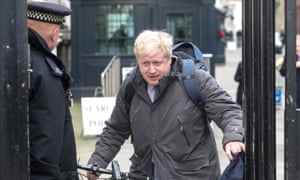The west’s leading economic thinktank has provided backing for David Cameron’s pro-EU stance by warning that a UK vote to leave the union would cause lasting damage and would harm the rest of the world.
Catherine Mann, the chief economist at the Organisation for Economic Co-operation and Development, said a no vote would be “bad for the UK, bad for Europe and bad for the global economy”.
Speaking in London on Thursday, Mann said she was not convinced by the argument made by Boris Johnson, the mayor of London, that the long-term benefits of departure would outweigh short-term costs.
She said: “40% of the UK’s trade goes to Europe. It will be faced with tariffs. Trade will be more costly. Divorce would take two years, and that’s a long time for there to be uncertainty.”
Mann said the City could be particularly hard hit because financial services were not covered by World Trade Organisation agreements.
She predicted the UK would cease to be as attractive a destination for inward investment if it left the EU and that companies would instead locate to another European country. “If you are outside [the EU] trying to decide where to do investment, where are you going to go: to the one that’s big or the one that has just left?” Mann said.

The OECD is preparing a report on the potential impact of leaving the EU, to be published before the referendum on 23 June. The Paris-based organisation, which has 34 rich-country members, is concerned about the weakness of the eurozone economy and has become increasingly downbeat about the prospects for the global economy.
Mann said she thought an EU exit would not just affect the UK. She voiced her concerns as the prime minister challenged the idea that departure from the EU would represent only a short, sharp shock.
“Let’s just remember what a shock really means,” Cameron said. “It means pressure on the pound sterling. It means jobs being lost. It means mortgage rates might rise. It means businesses closing. It means hard-working people losing their livelihoods.
“For those who advocate leaving, lost jobs and a dented economy might be collateral damage, or a price worth paying. For me, they’re not. They never are. Because there’s nothing more important than protecting people’s financial security. That’s why I believe we are better off in.”
Johnson compared the effects of Britain leaving the EU to the shape of a “Nike tick” – down initially but up strongly once the shock had worn off. Mann said she thought there would be more permanent damage: “I don’t see a tick, I see an ‘L’ shape.”
She spoke after presenting a report in which the thinktank says there is no evidence that countries that brought in tough environmental policies have seen their exports suffer as a result.
“Governments should stop working on the assumption that tighter regulations will hurt their export share and focus on the edge they can get from innovation,” Mann said.
The OECD said countries that were the first to embrace the opportunities provided by last December’s Paris agreement to tackle climate change would reap economic benefits.
EU referendum: Brexit bad for UK, Europe and the world, warns OECD – The Guardian

